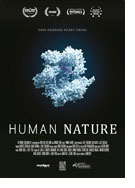

Opening 19 Nov 2020
Directed by:
Adam Bolt
Writing credits:
Adam Bolt, Regina Sobel
Human Nature is an in-depth documentary about gene technology’s sharpest tool: the genetic scissors CRISPR–Cas9 that can edit the DNA of plants, animals, humans and microorganisms with extremely high precision and change the code of life. The film covers the work that led to the discovery of CRISPR–Cas9 (clustered regularly interspaced short palindromic repeats – CRISPER associated protein 9). It began in the 1990s when Francisco Mojica in Alicante, Spain identified repeated genome structures in microorganisms of the Archaea family living in highly crystallized salt pools. Between the repeats were spacers that contained a piece of the genome of an earlier predator (virus). These spacers act like a wanted poster for any invading predator and the extraordinary protein Cas9 polices for the wanted poster and cleaves the DNA of the predator. The 2005 discovery of this ancient immune system led Jill Banfield to state “What an idea! A piece of genome of your predator was stuck in your genome.” Mojica expressed his amazement: “These tiny organisms are so clever”; and Feng Zhang, “Nature is one of the greatest inventors of all time.” In 2013, Emmanuela Charpentier and Jennifer Doudna defined a simple genetic system with Cas9 and RNA that could be programmed to cleave DNA at any predetermined site and revolutionized life sciences.
Many leading scientists (the Who’s Who in CRISPR) make appearances, including Charpentier and Doudna, who were awarded the 2020 Nobel Prize in Chemistry for their discovery of the genetic scissors; Banfield, Banfield Laboratory UC Berkeley, who introduced Jennifer Doudna to CRISPR-Cas9 and who said her gravestone legacy “is having invited Doudna to explore the chemistry of CRISPR-Cas9”; Mojita, the microbiologist who discovered and named CRISPR; George Church, whose lab at Harvard Medical School has turned science fiction into reality; and Fyodor Urnov, director of Innovation Genomics at UC Berkeley and a gifted explainer of complex mechanisms. The film presents the tragedy of genetically inherited diseases that could benefit from genetic editing with empathy and depth. It addresses the use of the gene-editing of nature (e.g., leaves and corals) to mitigate climate change. The historical footage from the 1960s era of genetic engineering and from interviews with notables such as Adolfus Huxley puts CRISPR-Cas9 genetic scissors into perspective.
The ethical question of gene editing in humans is addressed in detail from both sides. “This tool”, Doudna states, “has the ability to change the fundamental chemical nature of who we are”. Bioethicist Alta Charo discusses the decision of the commission appointed by the National Academies of Science and Medicine, which concluded that it is ethically defensible to use the genetic scissors for germline (sperm, eggs, embryos) gene editing, e.g., in cases of serious hereditary diseases and not intrinsically evil. Urnov points out that we are still a long way from editing the human and that the things we cherish most like creativity, emotionality, and love are the most genetically complex.
This documentary with its beautiful coverage of the technology and great diversity of personalities is an excellent chance to learn about the science of this revolutionary genetic tool and what it can mean for all of us. (Carol Strametz)